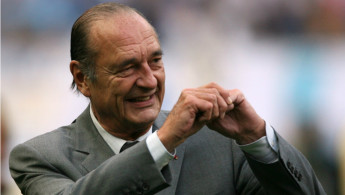The centre-right Chirac rose to prominence as mayor of Paris before becoming prime minister and then serving as head of state from 1995-2007.
"President Jacques Chirac died this morning surrounded by his family, peacefully," his son-in-law Frederic Salat-Baroux told AFP.
His time at the Elysee saw France advance on European integration and, in a landmark moment for relations with Washington, loudly oppose the US-led invasion of Iraq in 2003.
But his legacy is also shadowed by a conviction for graft dating to his time as mayor of Paris. After leaving office he was handed a suspended jail term that nonetheless did little to dent his popularity among supporters.
'Made history'
First elected head of state in 1995 and then re-elected in 2002, Chirac's 12 years in the Elysee Palace made him France's second longest-serving post-war president after his Socialist predecessor Francois Mitterrand.
On the international stage, Chirac will be best remembered for angering the United States with his public opposition to the 2003 war in Iraq.
"Jacques Chirac is part of the history of France," said parliament speaker Richard Ferrand.
He said he left behind a "a France that was like him - complex, sometimes crossed by contradictions and always motivated by an unbridled Republican passion."
Both chambers of France's parliament - the lower House National Assembly and the upper house Senate - observed a minute of silence as the news was announced.
'Loved France so much'
A conservative politician but with an appeal that extended beyond the right, Chirac served two stints as prime minister in 1974-76 and 1986-88 and was mayor of his native Paris from 1977-1995.
It was his time at the helm of the French capital that resulted, once he had lost his presidential immunity, in a conviction for embezzlement and misuse of public funds.
Chirac was found guilty in December 2011 of influence peddling, breach of trust and embezzlement.
He contested the ruling but did not appeal it, saying the French people "know who I am: an honest man" who worked only for "the grandeur of France and for peace".
Despite his long marriage to Bernadette, his passion for women was also renowned. He said just before leaving office: "There have been women I have loved a lot, as discreetly as possible."
He suffered a stroke in 2005 and underwent successful kidney surgery in December 2013, and was rarely seen in public in recent years.
A politician with a popular touch, who loved the company of farmers and whose other interests included Chinese art, Chirac was regarded by supporters as one of France's most charismatic post-war politicians.
"He loved France so much. He loved the people, he loved touching them, he loved seeing them, he loved laughing with them," Line Renaud, an actress and friend of the former leader, told BFM television channel.
European Commission and former Luxembourg premier Jean-Claude Juncker was "moved and devastated" to learn of Chirac's death, a spokeswoman said, adding that Europe was losing a "great statesman".
All sides of the political spectrum in France, for once, came together to pay tribute to what he had done for the country.
Chirac "loved France more than those who came after," said far-left leader Jean-Luc Melenchon.
Far-right National Rally leader Marine Le Pen said he was "capable of opposing madness and the war in Iraq".
Follow us on Twitter: @The_NewArab





 Follow the Middle East's top stories in English at The New Arab on Google News
Follow the Middle East's top stories in English at The New Arab on Google News
![The UAE is widely suspected of arming the RSF militia [Getty]](/sites/default/files/styles/image_330x185/public/2024-11/GettyImages-472529908.jpg?h=69f2b9d0&itok=Yauw3YTG)
![Netanyahu furiously denounced the ICC [Getty]](/sites/default/files/styles/image_330x185/public/2024-11/GettyImages-2169352575.jpg?h=199d8c1f&itok=-vRiruf5)
![Both Hamas and the Palestinian Authority welcomed the ICC arrest warrants [Getty]](/sites/default/files/styles/image_330x185/public/2024-11/GettyImages-2178351173.jpg?h=199d8c1f&itok=TV858iVg)